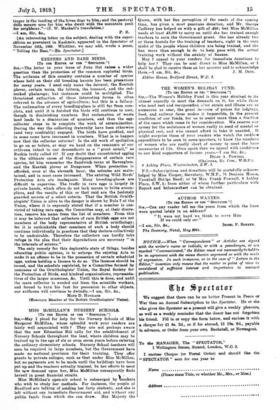KEEPERS AND RARE BIRDS.
[TO THE EDITOR Or TH11 " SPECTATOR.")
SIR,—The letter in your issue of June 21st raiees a wider question than the protection of the common raptorial birds. The avifauna of this country contains a number of species whose hold on their old breeding haunts has been precarious for many years. I need only name the dotterel, the Kentish plover, certain terns, the bittern, the buzzard, and the rednecked phalarope; but instances could be multiplied. The threatened extinction of these interesting forma is often referred to the advance of agriculture; but this le a fallacy. The reclamation of every breeding-place is still far tnom complete, and until it is finished the birds will continue to nest, though in diminishing numbers. But reclamation of waste land leads to a diminution of numbers, and then the eggcollector steps in to complete the work of extermination. During the war the collecting fraternity have been otherwise (and very creditably) engaged. The birds have profited, and in some cases have increased in numbers. What is to happen now that the collector returns? Is the old work of spoliation: to lee on as before, or may we hand on the remnants of our avifauna intact to our descendants as a "great entail," as Ruskin truly called it? If any doubt that unrestricted egging is the ultimate cause of the disappearance of certain rare species, let him remember the Sandwich terns at Ravenglass, and the Kentish plover at Dungeness. When protection is afforded, even at the eleventh hour, the colonies are maintained, and in most cases increased. The existing Wild Birds' Protection Acts are inadequate. Many breeding-places are difficult to supervise. The traffic in rare eggs is largely in private hands, which often do not lack means to bribe accomplices, and the results of this or that raid are the jealously guarded secrets of a select coterie. That the British Ornithologists' Union is alive to the danger is shown by Rule 7 of the Union, where it is expressly stated that if a member is convicted of taking rare eggs, the Committee may, at their discretion, remove his name from the list of members. From this it may be inferred that collectors of rare British eggs are not members of the body representative of British ornithology; for it is unthinkable that members of such a body should continue individually in practices that they declare collectively to be undesirable. Therefore the collectors can hardly take refuge in the plea that their depredations are necessary "in the interests of science."
The only remedy for this deplorable state of things, besides educating public opinion, is to enlarge the existing Acts to make it an offence to be in the possession of certain scheduled eggs, unless holding a licence to do so. The licences should be issued, and the schedule regulated, by a Committee formed by nominees of the Ornithologists' Union, the Royal Society for the Protection of Birds, and kindred organizations, -representatives of the larger museume, &c. Until this Is done, and until the mere collector is weeded out from the scientific workers, and forced to turn his lust for possession to other objects, our avifauna will continue to dwindle.—I am, Sir, &a, Msue D. ITAVILAND (Honorary Member of the British Ornithologists' Union).














































 Previous page
Previous page